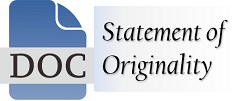Keadaban Digital dan Etika Tauhid: Telaah Kritis Filsafat Pendidikan Muhammadiyah dalam Era Literasi Artifisial
DOI:
https://doi.org/10.31599/75pzsx34Keywords:
Digital Civility, Digital Literacy, Islamic Educational Philosophy , Muhammadiyah Education , Tauhidic EthicsAbstract
The advancement of digital technology and the emergence of artificial intelligence demand that the education sector, including Muhammadiyah, integrate technological sophistication with Islamic ethical values. This paper examines the thoughts of KH Ahmad Dahlan within the framework of Muhammadiyah’s educational philosophy in responding to the challenges of digitalization and digital literacy. Using a qualitative literature study approach, the discussion focuses on the concept of tauhidic ethics an ethical foundation rooted in the oneness of God (tauhid) and its application in fostering digital civility. This concept is compared with the ideas of Syed M. Naquib Al-Attas on adab, Seyyed Hossein Nasr on spirituality and technology, Paulo Freire on critical literacy, and Mike Ribble on digital citizenship. The study shows that tauhidic ethics is relevant in shaping ethical digital behavior, in line with Al-Attas’ emphasis on the proper placement of knowledge, and Nasr’s view on the importance of spiritual dimensions in the use of modern technology. Freire contributes a critical awareness perspective that aligns with the Islamic principle of tabayyun (verification), while Ribble offers practical guidelines that can be integrated with Muhammadiyah values such as the Akhlaq Sosmediyah movement. Therefore, Muhammadiyah
Downloads
References
Alismaiel, O. A. (2023). Digital Media Used in Education: The Influence on Cyberbullying Behaviors among Youth Students. International Journal of Environmental Research and Public Health, 20(2). https://doi.org/10.3390/ijerph20021370
Bulathwela, S., Pérez-Ortiz, M., Holloway, C., Cukurova, M., & Shawe-Taylor, J. (2024). Artificial Intelligence Alone Will Not Democratise Education: On Educational Inequality, Techno-Solutionism and Inclusive Tools. Sustainability (Switzerland), 16(2), 1–20. https://doi.org/10.3390/su16020781
Bustamam, M. (2024). Instilling Faith and Morals in Early Childhood. Jurnal Al-Fikrah, 13(2), 305–315. https://doi.org/10.54621/jiaf.v13i2.1013
Cortina, R., & Winter, M. (2021). Paulo Freire 's Pedagogy of Liberation. 23(2), 8–19.
Haryaka, U., & Khadijah Razak, N. (2025). Integrating Digital Literacy, Critical Thinking, and Collaborative Learning: Addressing Contemporary Challenges in 21st Century Education. Journal of Hunan University Natural Sciences, 52(Volume 52, Issue 3). https://doi.org/10.55463/issn.1674-2974.52.3.9
Husnaini Rahmi Arrumi. (2025). Penguatan Pendidikan Tauhid melalui Konten Digital Interaktif untuk Siswa Kelas V SDIT Insan Kamil di Era Media Sosial. Jurnal Miftahul Ilmi: Jurnal Pendidikan Agama Islam, 2(1), 230–236. https://doi.org/10.59841/miftahulilmi.v2i1.108
Jaya, P. H. I., Saptoni, & Haq, M. I. (2023). Islamism without commotion: the religious transformation of Tuak Kampong in West Lombok. Indonesian Journal of Islam and Muslim Societies, 13(1), 29–56. https://doi.org/10.18326/ijims.v13i1.29-56
Khoirudin, A., Baidhawy, Z., & Nor, M. R. M. (2020). Social Reconstruction in Indonesia : Humanitarian and. Journal of Al-Tamaddun, 15(1), 183–197.
Leiter, B. (2021). The Epistemology of the Internet and the Regulation of Speech in America. SSRN Electronic Journal. https://doi.org/10.2139/ssrn.3939948
Machfiroh, R., Sapriya, & Komalasari, K. (2020). Indonesian Youth Readiness in Supporting Unlimited Education Society 5.0. 418(Acec 2019), 529–533. https://doi.org/10.2991/assehr.k.200320.100
Maraulang, M. (2025). KH. Ahmad Dahlan and the Muhammadiyah Movement. International Journal of Asian Education, 6(1), 164–175. https://doi.org/10.46966/ijae.v6i1.427
Muhammad, A., & Kerwanto. (2023). Relevansi Pemikiran Seyyed Hossein Nasr Tentang Integrasi Islam Dan Sains Terhadap Pendidikan Islam Di Indonesia. EDUMULYA: Jurnal Pendidikan Agama Islam, 1(2), 8–24. https://doi.org/10.59166/edumulya.v1i2.105
Mujiburrohman, & M. Erlin Susri. (2022). Integrasi pendidikan islam dan sains dalam pandangan Muhammad Naquib Al Attas. Educenter : Jurnal Ilmiah Pendidikan, 1(5), 458–465. https://doi.org/10.55904/educenter.v1i5.163
Mukhlis, F., Yusuf, Z., Fiadha, A. A., & Wachid, M. S. (2023). Pendampingan Literasi Digital dan Dakwah Media Sosial Pada LKSA Aisyiyah Kota Batu. Jurnal Aplikasi Dan Inovasi Ipteks “Soliditas” (J-Solid), 6(2), 172. https://doi.org/10.31328/js.v6i2.4746
Munisa, M., Putri, U. N., Sari, W. V., & Fitri, N. A. (2024). Digital Literacy Based on Local Wisdom in Inclusive Education. Pionir: Jurnal Pendidikan, 13(1), 120–124. https://doi.org/10.22373/pjp.v13i1.22058
Nās, A.-. (2024). International Journal of Engineering Business and Social Science EDUCATIVE VALUE IN THE QUR ’ AN : A STUDY OF SURAH AL- IKHLAṢ ,. 3(02), 246–260.
Oral, U. (2023). Netiquette: Fundamentals of Etiquette in Digital Communication. European Journal of Theoretical and Applied Sciences, 1(5), 833–847. https://doi.org/10.59324/ejtas.2023.1(5).70
Raihani. (2020). A model of Islamic teacher education for social justice in Indonesia a critical pedagogy perspective. Journal of Indonesian Islam, 14(1), 163–186. https://doi.org/10.15642/JIIS.2020.14.1.163-186
Rohanita, L., Azizah, M. F., Sholihah, S., Mirrohmatillah, M., & Aini, N. (2025). The Relevance of Religious Knowledge in the Digital Age: A Quranic Guide for the Modern Generation. Journal of Modern Islamic Studies and Civilization, 3(01), 90–99. https://doi.org/10.59653/jmisc.v3i01.1386
Rozak, A. (2023). Analisis Peran Guru Pendidikan Agama Islam Dalam Membentuk Karakter Religius Siswa Kelas Vii Di Sekolah Mts Negeri 01 Pamulang Tangerang Selatan: Pendekatan Metode Literature Study and Review (Lsr). El Banar : Jurnal Pendidikan Dan Pengajaran, 6(1), 1–8. https://doi.org/10.54125/elbanar.v6i1.149
Samsir, S. (2024). Konsep Tabayyun Dalam Al-Quran Analisis Terhadap Fenomena Penyebaran Hoax Di Media Sosial. TAFASIR: Journal of Quranic Studies, 2(2), 96–111. https://doi.org/10.62376/tafasir.v2i2.41
Sholihul Anwar, Siti Rosyidah, & Sukisno. (2024). Development of Islamic Personality in the Digital Era With a Monotheism-Based Character Education Model. Jurnal Pedagogy, 17(2), 189–198. https://doi.org/10.63889/pedagogy.v17i2.237
Simamora, I. Y., & Farid, A. S. (2024). Rethinking the use of Social Media in Islamic Broadcasting Practices: A Theological Perspective. Pharos Journal of Theology, 105(5), 1–15. https://doi.org/10.46222/pharosjot.105.516
Sugiarto & Farid, A. (2023). Sugiarto. Jayapangus Press Cetta: Jurnal Ilmu Pendidikan, 6 (3), 580–597. file:///C:/Users/ASUS/Downloads/Sugiarto.pdf
T, S., & K, T. (2024). Fostering Responsible Behavior Online- Relevance of Cyber Ethics Education. Malaysian Online Journal of Educational Technology, 12(1), 32–38. https://doi.org/10.52380/mojet.2024.12.1.428
Tygel, A. F., & Kirsch, R. (2016). Contributions of Paulo Freire for a Critical Data Literacy: a Popular Education Approach. The Journal of Community Informatics, 12(3), 108–121. https://doi.org/10.15353/joci.v12i3.3279
Walter, Y. (2024). Embracing the future of Artificial Intelligence in the classroom: the relevance of AI literacy, prompt engineering, and critical thinking in modern education. International Journal of Educational Technology in Higher Education, 21(1). https://doi.org/10.1186/s41239-024-00448-3
Xu, Z. (2025). Innovative Applications of Artificial Intelligence in New Media Content Creation and Dissemination. Frontiers in Humanities and Social Sciences, 5(2), 85–91. https://doi.org/10.54691/dz2hgr20












_-_Copy1.jpg)




